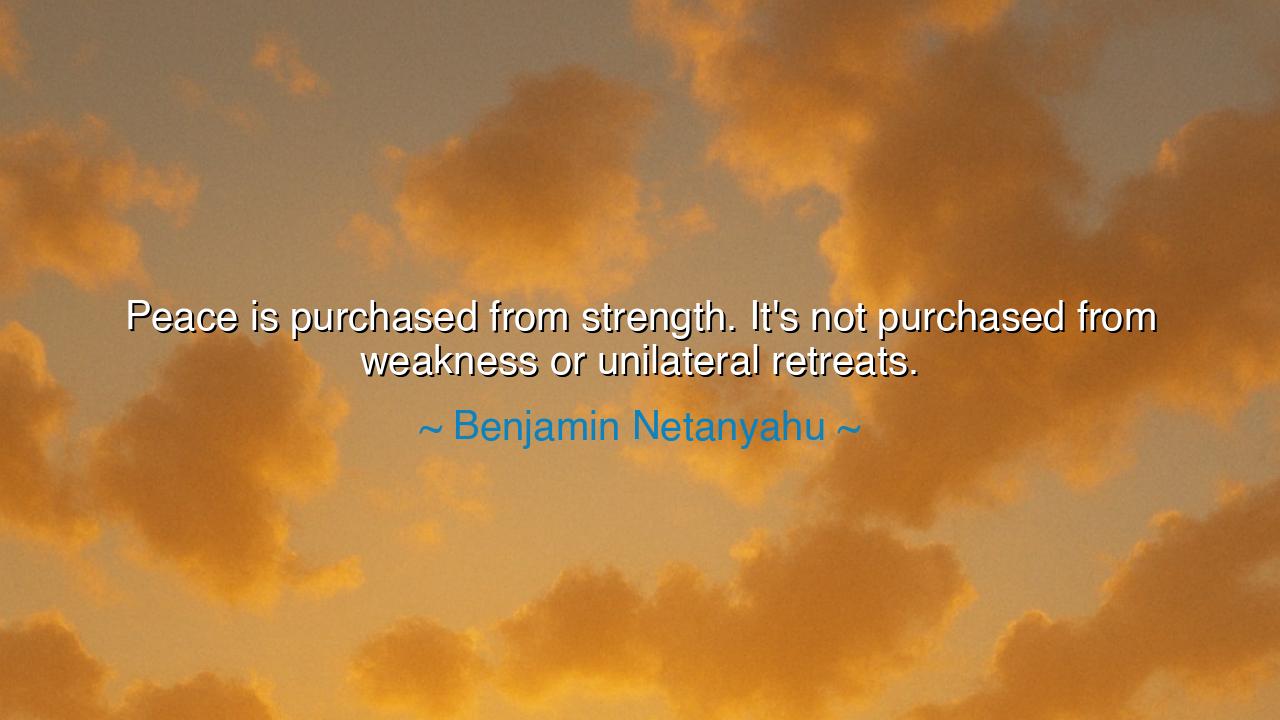
Peace is purchased from strength. It's not purchased from
Peace is purchased from strength. It's not purchased from weakness or unilateral retreats.






Hear the words of Benjamin Netanyahu, spoken with the weight of history and the fire of urgency: “Peace is purchased from strength. It's not purchased from weakness or unilateral retreats.” In this declaration lies a principle as old as nations themselves—that true peace is not the fruit of surrender, nor the gift of an enemy’s mercy, but the harvest of steadfast courage, vigilance, and the will to defend what is sacred. For peace built upon weakness is no peace at all; it is but a pause before destruction, a fragile illusion easily shattered.
Strength is not only the power of armies, but the resolve of a people, the unity of their spirit, and the clarity of their purpose. A nation that retreats without cause, that yields its dignity to avoid conflict, does not win peace but invites aggression. History has shown again and again that those who seek peace through appeasement are soon devoured by those who see their weakness. Netanyahu’s words are a reminder that peace, if it is to endure, must be forged not through fear but through resilience.
The ancients knew this truth. The Romans, whose empire spanned the world, proclaimed “Si vis pacem, para bellum”—“If you want peace, prepare for war.” They understood that the stability of their lands was preserved not by pleading for mercy but by demonstrating power so formidable that few dared challenge it. The shield was as essential as the olive branch, and the sword behind the shield was what gave meaning to the olive branch itself.
Consider the story of Winston Churchill in the dark days of the Second World War. When others counseled appeasement, when many sought to avoid the storm by yielding ground to tyranny, Churchill refused. He declared that only by strength, by standing firm against overwhelming odds, could Britain hope to survive and secure peace for future generations. His defiance, born of strength rather than retreat, inspired a nation and altered the course of history. Had he sought peace through weakness, the world might have drowned beneath tyranny’s shadow.
Yet strength is not brutality, nor is it cruelty. True strength is disciplined, measured, and guided by justice. The peace purchased from such strength is not the domination of the weak, but the preservation of freedom, dignity, and the possibility of flourishing for all. Strength without justice becomes tyranny; justice without strength becomes helplessness. But when the two are joined, the result is a peace that cannot easily be shaken.
The lesson for every soul is this: do not seek peace in your own life through weakness or constant retreat. Whether in relationships, in labor, or in the battles of the spirit, you cannot preserve harmony by abandoning your principles or yielding endlessly to the demands of others. Peace is purchased from strength—from the courage to set boundaries, from the wisdom to defend your values, from the resilience to endure trials without surrender. Only then will your peace be real, and not a fragile illusion.
Practical steps are these: cultivate strength in both body and spirit. Do not fear confrontation when truth is at stake. Learn from history’s warnings that appeasement breeds only greater conflict. In your own life, practice the discipline of standing firm—say no when necessary, uphold your dignity, and protect what is worth protecting. For peace is not passivity, but the fruit of courage that endures.
Thus remember Netanyahu’s words: peace is not bought with weakness, but with strength. Do not retreat into illusions, nor yield to fear. Build your strength, wield it with justice, and let it guard your peace. For only then will your peace endure—not as a fleeting shadow, but as a fortress, standing firm against the storms of the world.






AAdministratorAdministrator
Welcome, honored guests. Please leave a comment, we will respond soon